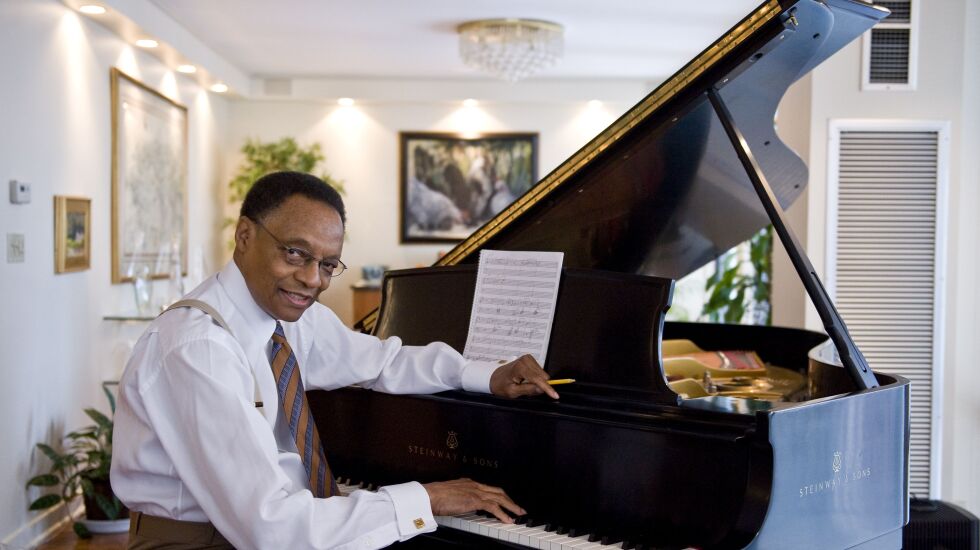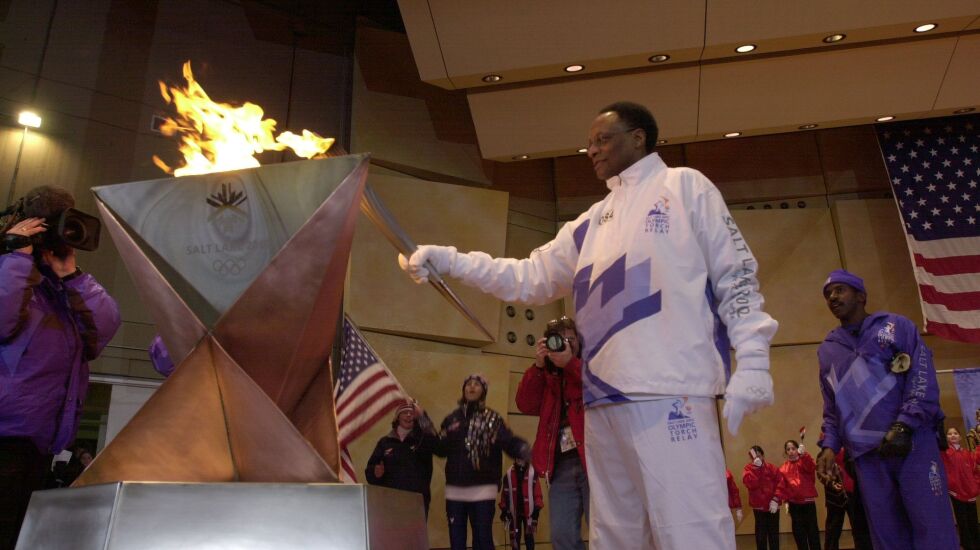
Ramsey Lewis wanted to be a classical pianist. He chose jazz only because there were no Black classical pianists at the time. The road appeared to be closed. His mentor, Dorothy Mendelson, told him jazz would be a better route.
But that wasn’t the only hurdle the Chicago-born jazz legend needed to overcome on his road to greatness.
There was the pecking order in his own family, and the fact that his parents could afford piano lessons for only one of their kids — and Ramsey wasn’t the “first choice,” according to his son.
“My aunt Lucille was the one who took piano lessons first, and Dad just wanted to do what his big sister was doing. … [but] granddad couldn’t afford both lessons. He was a janitor, and my grandmother was a maid,” the Rev. Bobby Lewis, Ramsey’s son, recalled.
“Once the teacher saw that Dad had talent — what she felt was greater than Lucille — then they decided to invest that quarter, I believe, a week, on Dad.”
Bobby Lewis recalled the Lewis family was “rooted in the church.” His grandfather was a pastor who insisted his son play for the church and for the choir.
“My grandfather wanted my dad to be a classical pianist. Dad wanted to be a classical pianist. But there was a crossroads. At the time, there were no African American classical pianists,” Bobby Lewis said.
“There was an opportunity for Dad to play jazz. The artist’s name was Willis Burton. … He wanted Dad to come play with him at 15 years old in a jazz setting. And Dorothy Mendelson was the one to tell my grandfather it was OK because that’s probably the better route to go because it would be hard for Dad to break through in classical.”
Ramsey Lewis, the iconic jazz pianist and composer who went on to become a musical legend and Chicago’s gift to the world, died this week at the age of 87.
On Thursday, his son joined Welz Kauffman, former president and CEO of the Ravinia Festival in Highland Park, to pay tribute to the man whose musical achievements and educational legacy will be difficult to duplicate.
If ever there was a life well-lived, a life to be celebrated, it is the life of Ramsey Lewis. Three Grammy Awards. Eighty albums, five of them gold. A National Endowment for the Arts Jazz Master. An entire generation — or two or three — of jazz students and musicians he inspired through Ravinia’s Jazz Mentor/Jazz Protégé program.
Kauffman described Ravinia’s program as a “citywide, Chicagoland program to identify the very best young, up-and-coming jazz performers and give them tutelage from the best working musicians” in the area.
“Ramsey really wanted this to happen. But unlike a lot of great, legendary performers who create such programs in their name … he always stuck with it. He always made appearances. He always would show up unannounced at rehearsals,” Kauffman said.
“He would show up unannounced at a board meeting because he was on the board at Ravinia, and I would get nervous. … But here are these 15-year-old kids. They were never nervous. They trusted him. They felt honored by his presence and what he could bring them. But that personality, that kindness, that generosity of spirit” was one of his most enduring gifts.
As a freshman at Chicago’s Wells High School, Ramsey Lewis joined a group called the Clefs. Three of its original members — Ramsey Lewis, Red Holt and L.D. Young — became the Ramsey Lewis Trio. Ramsey Lewis got top billing, even though Kaufmann remembered him as a musicians who “always wanted to collaborate with others as equals.”
In 1965, that trio scored a breakthrough, crossover hit, “The In Crowd,” that soared to the top of the pop charts.
But that surprising development for a jazz recording almost didn’t happen, either, as Ramsey Lewis recalled to his son in a conversation just a few weeks before his death.
“He and the trio were in D.C. They were looking for an album filler. They had all of the other songs chosen. And they were at dinner. They were looking for that last song. And the waitress came up to them and said, ‘You should listen to the song, ‘The In Crowd.’ They listened to it and said, ‘OK. We’ll put it on there.’” They added it to the set. It was a live performance. And it became a hit,” Bobby Lewis said.
“It’s never the one that you think that it’s gonna be. But for that particular song, that’s how it ended up on the album.”
Kaufmann said he will never forget the Jazz Legends concert at Ravinia that brought together Ramsey Lewis, Dave Brubeck, Oscar Peterson and Marian McPartlin. They all did solo sets that night, then played together.
When it was over, Kaufmann went backstage and found the four legendary musicians who reveled in each others’ talents, engrossed in a deep and very private conversation about the influence that French composer Claude DeBussy had on all of their “playing and their touch and their style.”
“They’re talking about ‘Afternoon of a Faun.’ They’re talking about the ‘Piano Preludes.’ And they’re talking about harmony. I sort of stumbled into the room as I often do, sadly. [But], I kind of tiptoed out. I thought, ‘I want to be a fly on the wall and hear this.’ But they’re having a very personal conversation about things,” he said.
“What I’m talking about is the sense of equality. That everybody’s opinion matters. And that you can always learn something new and get something new.”

Yet another Ravinia backstage moment involving Ramsey Lewis occurred the night Van Cliburn played there. Barack and Michelle Obama — during the former president’s days as a state senator — went backstage after the performance with album covers for Van Cliburn to autograph.
“At the end of their brief conversation, Van Cliburn said, ‘When was the last time you were here at Ravinia?’ And Michelle and Barack said, ‘I guess we were here for a Ramsey Lewis concert.’ And Van Cliburn looked at them and said, ‘Ramsey Lewis played here?’” Kaufmann recalled.
“And I said, `Yeah, he’s been the artistic director of jazz for decades, and of course, a Chicago legend.’ And Van Cliburn looks at me and says, ‘I know who he is. I know he’s a Chicago legend. He’s a worldwide legend.’ He said, ‘I can’t believe I’ve been on the same stage as Ramsey Lewis.’ The Obamas left walking on air — as did I. It was such a spontaneous, marvelous thing.”
Kaufmann was the driving force behind persuading Lewis to compose “Proclamation of Hope,” an orchestral reflection on the life of Abraham Lincoln for the 2009 bicentennial celebration of the former president.
That did not require the hard sell Kaufmann feared it might.
The harder sell was persuading Ramsey Lewis to write the “Concerto for Jazz Trio” that allowed Lewis to finally make his debut with the Chicago Symphony.
“Ramsey’s 80th birthday was coming up, and I said, ‘Would you like to write a piano concerto?’ And he said, ‘Yeah. I’ve always wanted to do that. Who would I be writing it for?’ And I said, ‘You goofball. You.’ And he said, ‘I’ve never played with the Chicago Symphony Orchestra. ... When I was a little kid, I was told I would never play with the Chicago Symphony,’” Kaufmann recalled
“That actually took a longer convincing because I think he felt intimidated a little bit about the awesomeness of the Chicago Symphony, and would he be up to doing something” like that.
Bobby Lewis agreed.
“That was the dream, Welz … That was this childhood dream that you presented him with. That’s what I was telling you about when he was a kid. They told him, `You’ll never be a classical pianist. You’ll never be successful at that.’ So, you fulfilled a dream for him.”
In early June, Ramsey Lewis was scheduled to headline yet another night at Ravinia. Instead, the stunned, saddened audience was told he would not appear. A frail Ramsey Lewis appeared, only on video, leaving little doubt he would ever perform in public again. Jazz vocalist Kurt Elling and Bobby Lewis carried on that night.
For Bobby Lewis, it was a special night that allowed his father’s musical journey to come full circle.
“Dad was very real. He doesn’t have a fake bone in his body. He was letting us know that time was coming near. … He was always peaceful about it. Dad and I would always talk about the power of the universe and our place in the universe. His calmness about that was just incredible” as he approached his final days, Bobby Lewis said.
“I thank Ravinia for giving us that moment because, for him, me playing on that stage and being able to sing gospel, which was one of the founding influences in his life — it was just a wonderful moment for Ravinia, for myself and our family and for my father.”




.png?w=600)


